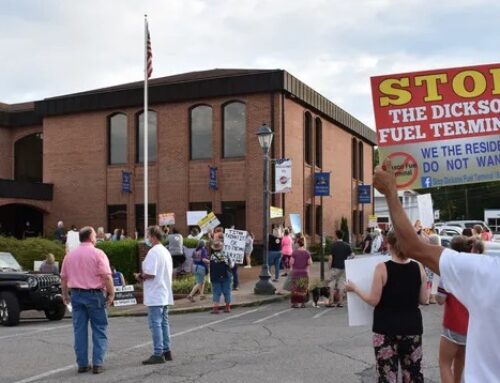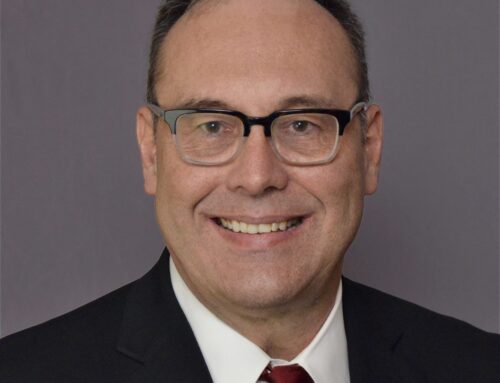Judge: State Republican party violated open meetings law when it removed Starbuck from ballot
A Davidson County chancellor ruled last week that the Tennessee Republican Party violated the open meetings law when its executive committee met and decided to remove Robby Starbuck from the August primary ballot.
Chancellor Russell T. Perkins declared the decision null and void because it was done in violation of the open meetings law and wrote that he expected all appropriate public officials “to immediately take steps to treat the Defendants’ April 11, 2022 decision as a nullity and to restore” Starbuck to the ballot.
Because the open meetings law is remedial, the party’s leaders could meet again, this time in compliance with the open meetings law, and take steps to cure the violation by posting adequate notice of a meeting, deliberating in public whether to remove Starbuck, allowing others to be heard and voting again.
However, the party has decided instead to try to appeal the ruling, filing paperwork with the appellate court today (June 6) and a motion to stay the Perkins’ ruling. The Court of Appeals has ordered Starbuck to file an answer to the application for an appeal and the motion to stay by 4 p.m. Tuesday (June 7).
Starbuck wants to run in the newly redrawn 5th Congressional District and filed to run in the Republican primary. The Republican party’s executive committee met in April and decided to remove him after determining he was not a bona fide Republican.
Party’s primary board meetings subject to open meetings law
State law allows political parties to require that candidates for their nominations be bona fide members of the party and the party gets to decide who is and isn’t a bona fide member. The law also says that all state primary board meetings are subject to the Open Meetings Act, which is in Title 8, Chapter 44 of the Tennessee Code.
T.C.A. § 2-13-108 (a)
(1) Each state primary board shall meet at a public building in Nashville at least once in every even-numbered year at the call of its chair, or on such other occasions as may be necessary in order that it may fulfill its duties under this title.
(2) Meetings of each state primary board shall be open and subject to title 8, chapter 44.
The Republican party argued that the open meetings law doesn’t apply because “this is a private, intra-party dispute about who is a bona fide Republican.”
“Defendants make the thoughtful distinction between the executive committee and the state primary board, asserting that only the executive committee is empowered to remove someone from the ballot. In deciding that Mr. Starbuck was not a bona fide Republican, however, Defendants were admittedly acting under powers granted to them under Title 2 of the Tennessee Code,” Perkins wrote in his order.
“Tennessee law requires that ‘[e]ach political party shall have a state executive committee which shall be the state primary board for the party.’ Tenn. Code Ann. § 2-13-102(a). Although the state primary board and the state executive committee often function as two bodies, the Court concludes, as asserted by Mr. Starbuck in his oral argument, that ‘[e]ach political party shall have a state executive committee which shall be that state primary board for the party.’ Additionally, when carrying out the duties and exercising the powers of Title 2 of the Tennessee Code, the primary board is subject to TOMA.” (Tennessee Open Meetings Act.),” Perkins wrote.
Here is the statute, T.C.A. § 2-13-102, that creates state primary boards:
Creation of state primary boards.
(a) Each political party shall have a state executive committee which shall be the state primary board for the party.
(b) The state primary board shall perform the duties and exercise the powers required by this title for its party.
(c) The state primary board of each statewide political party created by this section is the immediate successor to the state board of primary election commissioners of each party. Wherever in the Tennessee Code the state board of primary election commissioners of a political party is referred to, “state primary board” shall be substituted.
Judge: When executive committee carries out statutory duties, it’s subject to TOMA
Perkins concluded that for the purposes of carrying out powers and duties conveyed by Title 2 of the statute, “executive committee” and “primary board” are synonymous, and when the executive committee serves as the primary board in acting under Title 2, it is subject to the open meetings law. Thus, the state executive committee of the Tennessee Republican Party, was subject to the open meetings law when deciding whether to remove Starbuck from the ballot.
“The Court opines that this conclusion is consistent with, and promotes, the express policy adopted by the legislature: ‘The general assembly hereby declares it to be the policy of this state that the formation of public policy and decisions is public business and shall not be conducted in secret.’ Tenn. Code Ann. § 8-44-101(a). The decision to have a candidate for the U.S. House of Representatives removed from the ballot because he is not a bona fide Republican is a public decision made under the authority of Title 2 of the Tennessee Code, and is, accordingly, public business within the meaning of TOMA,” Perkins says in his ruling.
Perkins notes that the decision does not “disturb (the party’s) prerogative and autonomy to decide who is, or who is not, a bona fide Republican.
The ruling comes after a federal court refused to grant Starbuck an injunction. The federal court only addressed federal law claims and suggested Starbuck pursue his state law claims, including the open meetings law claim, in state court, which he did.
The federal court had set Friday, June 10, as the deadline for appropriate officials to implement a ruling requiring Starbuck to be restored to ballot, which Perkins mentioned in the meeting.
No notice of a “cure” meeting on party website
At this point, no public notice of a meeting in which the party might redo its decision in a so-called “cure meeting” has appeared on meetings page of the state party’s website.
Although a “cure meeting” is not defined in the statute, the courts in 1990 introduced the idea that a governing body that violates the Open Meetings Act can “cure” that violation by “new and substantial” reconsideration of its actions:
“…the purpose of the act is satisfied if the ultimate decision is made in accordance with the Public Meetings Act, and if it is a new and substantial reconsideration of the issues involved, in which the public is afforded ample opportunity to know the facts and to be heard with reference to the matters at issue.” (Court of Appeals, Neese v. Paris Special School District, 1990)




